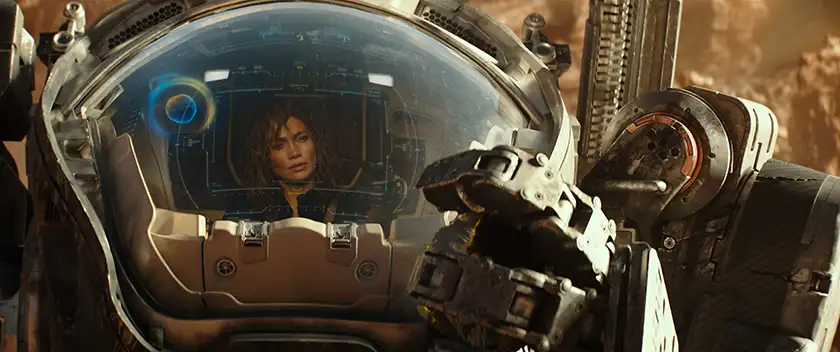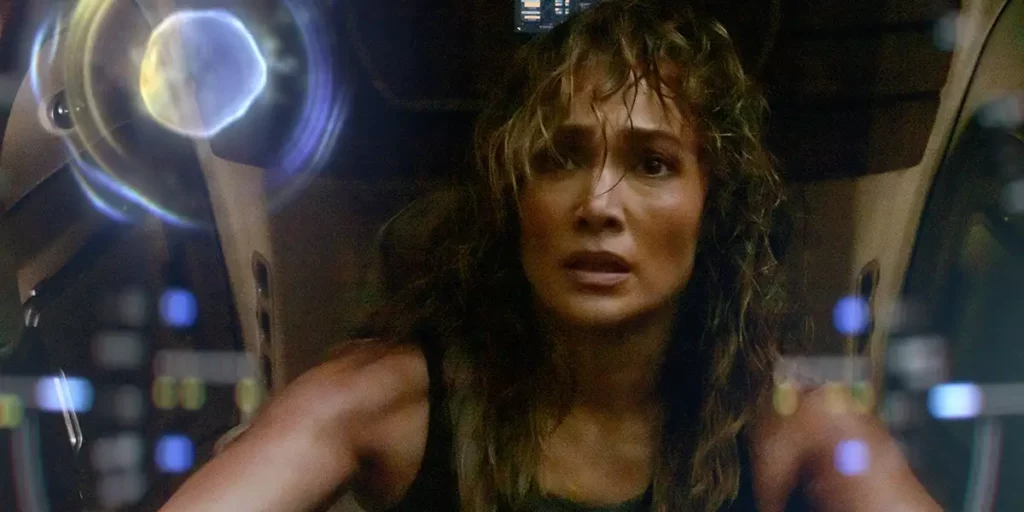Atlas’s unoriginality is laid bare with no other elements to foster immersion, and the end result is a movie that feels lost in the vacuum of space.
Director: Brad Peyton
Genre: Action, Drama, Sci-Fi
Run Time: 118′
Global Release: May 24, 2024
Where to watch: Netflix
Science fiction is a wonderful genre. It is rich with creative stories, exploring the possibilities of advanced technology, and using that to discuss topics about humanity and other philosophical ideas. And then there’s Atlas.
Directed by Brad Peyton, Atlas takes place in a future with advanced AI technology. Unfortunately, one of the AI named Harlan (Simu Liu, of Shang-Chi) rebels against humanity and starts wreaking havoc. Meanwhile, Atlas Shepherd (Jennifer Lopez, of Shotgun Wedding) is a misanthropic analyst who volunteers on a mission to capture Harlan. When the mission goes off rails, she has to survive by teaming up with a military AI, Smith (Gregory James Cohan, of A Little Water), despite her reservations.
Now you might be saying, “this looks far too clichéd! The plot beats and character arcs have been done way too many times in not just sci-fi stories, but in stories in general! Without any originality, why is there any reason to go see this movie?” And Atlas does give off that impression at first glance.
There is no punchline there, because that’s 100% correct.
Unoriginality does not break a film. I reviewed plenty of films that have employed cliché after cliché, and still been an enjoyable time. But when a movie does nothing to distract me from that unoriginality, that’s when it becomes a problem, and such is the case with Atlas. There were many things Atlas could have tried. It could have attempted to work on sheer star power, be self-aware of its unoriginality and aim for simple catharsis instead, or just pour everything into being a predictable but beautiful looking art piece. Yet it fails at all of those.
Atlas had the potential to be an engaging character. Jennifer Lopez is clearly giving it her all, and her overcoming misanthropy and learning to open up her shell could have been a relatable story to follow. However, that process never really feels organically laid out. From the start, her backstory and personal issues are laid out by two other characters talking about her, instead of letting an actual interaction between her and other characters display that to the audience.

Her learning to trust through interaction with an AI also had good potential, but the dialogue between them feels downright AI generated with how predictable it is. The characters have to open up to each other in order to maximize their performance, but all this does is lay out Atlas’s character arc in an even more contrived manner, as at one point she’s literally forced to exposit her backstory for the sake of plot. And their friendship never goes beyond the 90s buddy cop movie routine.
And on the other side, we have our main villain Harlan. On paper his relationship with Atlas seems interesting, but it is never really explored outside of one short dialogue scene. The rest of the time, he felt like Simu Liu was taking his James Bond villain audition with this movie, as any emotional or personal connection with Atlas that could have made him interesting is shoved aside by his hamminess. His motivation mainly comes down to “humans are self-destructive so destroying them will save the world.” I get that we suck a lot of times, but I don’t need a movie to remind me of that when so many sci fi stories have done it before.
Of course, it could have attempted to wow the audience by its design work alone. After all, sci fi is rife with potentially mesmerizing, imaginative, and exciting worlds. Unfortunately, while Atlas’s effects may look impressive for a Youtube Red original film, it simply does not cut it. Objects feel far too floaty in their environments, especially with the mech suits. (Yes, because we always have to check off that sci fi cliché as well.) They simply do not carry the weight or momentum that would be natural for them, making it too obvious it is CG. Not to mention the actual technology or places shown remain as common as a google image search for “sci fi world.”
Perhaps one or two of these unoriginal issues may not have been a problem. But when I look around and see absolutely nothing that allows the film to stand out, then there is no reason for me excuse it. I realize at this point, sci fi is an especially difficult genre to make original. But that doesn’t mean you should give up entirely. Someone should have realized they needed something more than what they had in order for this film to stand out, or at least not make me feel like I threw away two hours of my time. As it is, Atlas is a film that gives me very few things to even write about, and even less of a reason to go back to it.
Atlas will be available to stream on Netflix on May 24, 2024.

